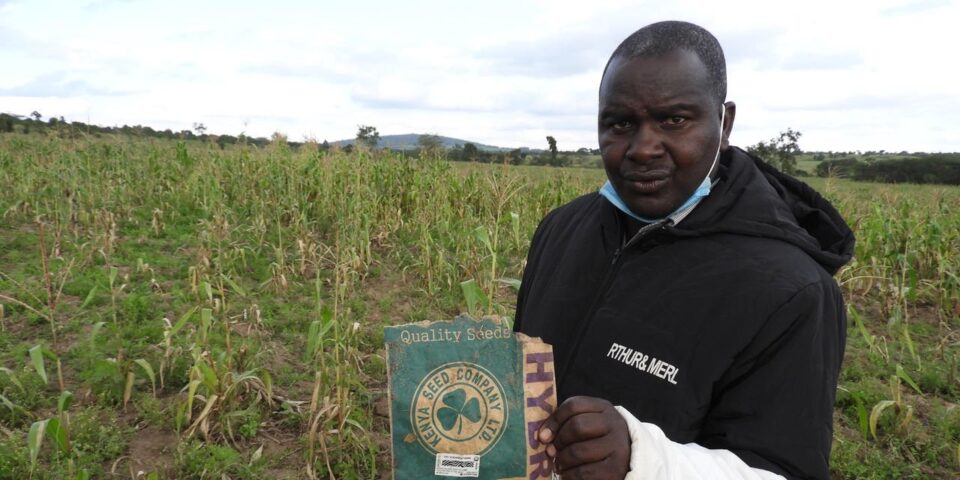Maize farmers from Bomet and Narok are counting losses after they were supplied with uncertified seeds that have led to crop failure.
Several maize farms in the region are dotted with stunted plants that have hardly grown to two feet. Affected farmers complained that they had been supplied with fake seeds by traders who were using Kenya Seed Company branded packages.
The crop has also been infested by pests and diseases, making it impossible for farmers convert it into silage for livestock.
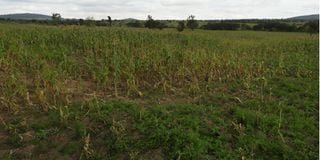
The farmers have asked the Kenya Plant Health Inspectorate Service (Kephis) and the Kenya Bureau of Standards (KBS) to investigate the matter and crack down on unscrupulous traders involved in the fake seeds racket.
Mr Philemon Chelogoi planted 43 acres of the fake seeds and is now staring at a loss of Sh600,000 including the cost of leasing the land, tilling, seed, fertilisers and weeding.
“It is unfortunate that as we count losses, the stockists are in business selling the fake maize seeds to unsuspecting farmers. It is mind boggling that the government, especially the Ministry of Agriculture and other relevant investigating agencies have not taken decisive action on this matter,” said Mr Chelogoi.
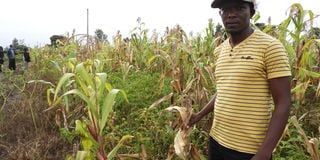
Investigation ongoing
Bomet County executive for Agriculture Kipchumba Towett said the matter was being investigated.
“Farmers have fallen prey to unscrupulous traders out to exploit them and cause not only losses, but affect food security in the country,” said Mr Toweett.
When the Nation.Africa team toured the affected farms, it witnessed maize plants that had turned yellow and had begun to wither.
Mr Kennedy Omoiyo, a farmer in Mulot Central in Narok South said he had been in maize farming for the last the last 25 years but had never suffered such a big loss.
“I bought seedlings from a stockist in Mulot Central, I planted the 624 variety, only to realise the crop was infested with disease before it turned yellowish and then withered. I have used more than Sh25,000 and expected to get an average of Sh45,000, but I have lost everything,” said Mr Omoiyo.
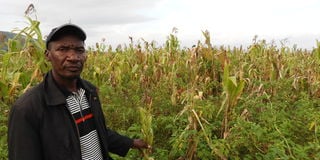
Lethal disease
The farmers had previously suffered losses after their maize fields were ravaged by the lethal necrosis disease in the South Rift valley region.
Mr Rashid Tonui, a farmer in Bomet County said he had expected to harvest 20 bags of maize per acre after investing Sh30,000 but the investment had gone down the drain.
“I bought the seedlings from an agro distributor outlet at Mulot trading centre and planted 23 acres of maize. But the crops germinated and later withered off. I thought it was as a result of acute weather conditions. I slashed the crops and planted beans after which I planted maize seeds that germinated with stunted growth,” said Mr Tonui.
The racket is expected to affect maize production in the region this year.
Kenya Seed company managers are reported to have toured the farms after receiving complaints from farmers but are yet to act on the matter.
Mr Fred Oloibe, the Kenya Seed managing director, said: “We have done our investigations and found out that the maize seed planted in the affected areas did not originate from Kenya Seed. Unscrupulous traders have sold fake seeds to farmers in the pretext that they are ours,” said Mr Oloibe.
He went on: “Kenya Seed is a state corporation and there is no way it can deal in fake seeds. We have a market and stake on food security in the country. Kenya Seed works with regulators in the sector including Kephis, Kebs and other government agencies in all production levels.”
“We work with agronomists and we have thorough internal mechanisms for quality assurance. We continuously monitor what is happening on the ground.”
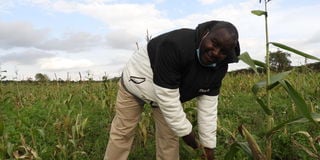
Photo credit: Vitalis Kimutai | Nation Media Group
Traders arrested
Detectives from the Serious Crimes Unit arrested two traders of Asian origin and a Kenya Seed Company Narok branch supervisor for theft of seedlings from the company and selling fake seeds to traders in the region, in a crackdown on March 2 in Narok town.
The detectives found 1,700 bales of stolen Kenya Seed Company’s high breed maize certified seeds variety 6213 valued at more than Sh7 million from a warehouse owned by the traders.
According to the DCI, one of suspects owned an agrovet and godown in Narok town in which 10 tonnes of the suspected stolen seeds were stored. The other one owned an outlet in Mulot sunset trading centre.
“Preliminary investigations indicate that in a bid to rake in more profits, at the expense of poor farmers, the crooked traders had packaged ordinary coloured maize grains, disguised as genuine high yielding Kenya Seed variety 6213,” said the DCI.
The sector is yet to fully recover while farmers have diversified to dairy and growing of tea, potatoes and vegetables while relying on other regions, especially the North and Central Rift for maize supply.
There's no story that cannot be told. We cover the stories that others don't want to be told, we bring you all the news you need. If you have tips, exposes or any story you need to be told bluntly and all queries write to us [email protected] also find us on Telegram

